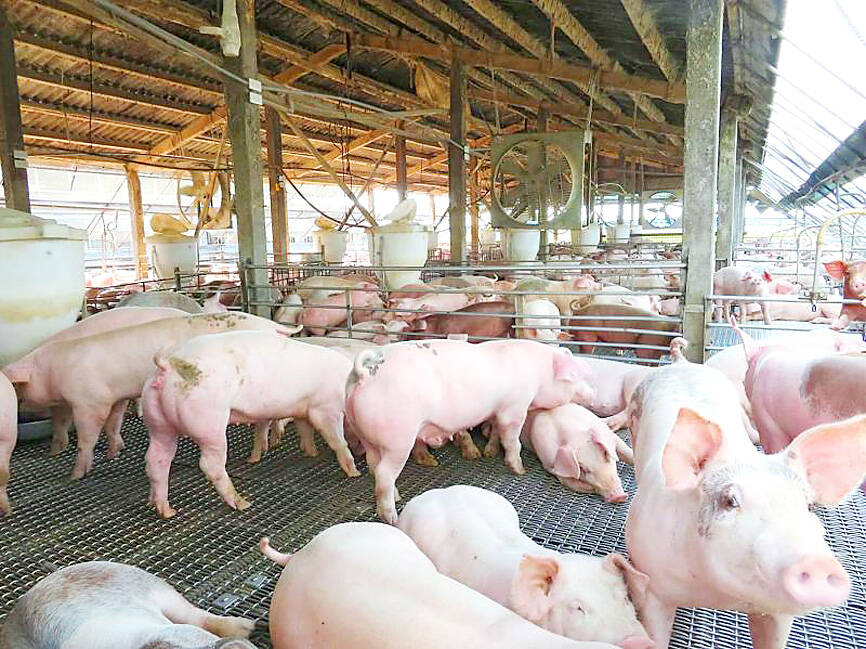Taiwan could become the first Asian nation that is not affected by three major swine diseases next year should the World Organisation for Animal Health (WOAH) approve the government’s application to become a swine fever-free country.
The Ministry of Agriculture applied because no swine fever cases were found for a year after the government stopped requiring domestically grown pigs to be inoculated.
If the application is approved, it would be an important milestone for Taiwan’s pig farming industry and show the nation has eliminated the spread of foot and mouth disease, African swine fever and classical swine fever, the agricultural ministry said, adding that Taiwan could be granted the status of swine fever-free nation next year.

Photo courtesy of Chiayi County Government
The status would also help expand the international market for Taiwanese pork, the ministry said.
Swine fever is a category-A zoonotic disease in Taiwan with a high mortality rate and can cause systemic hemorrhaging and stillbirths in pigs, it said, adding that countries are required to report swine fever cases to the WOAH.
While most Asian nations have been affected by swine fever-related diseases, the last case of swine fever detected in Taiwan was in Changhua County in 2005, the ministry said.
The government planned to make Taiwan a swine fever-free nation in three phases, the ministry said.
During the first phase between 2021 and 2022, all domestically-reared pigs had to be vaccinated against swine fever, it said.
The government also closely monitors environmental risks associated with the disease and communicates with pig farm industry representatives about related issues, the ministry said.
The government last year began the second phase by continuing to monitor environmental risks for the disease and gradually stopping swine fever vaccine injections, the ministry said.
During the third phase, which is to begin this month, the agricultural ministry filed an application to become a swine fever-free nation, it said.
The measure to gradually discontinue vaccinating domestically reared pigs was implemented in two stages, the ministry said.
In the first stage, which lasted from January to June last year, pigs were no longer required to be vaccinated against swine fever, except for breeding pigs, the ministry said.
In the second stage, which began in July last year, all pigs are exempt from vaccination, it said.
“We have found no traces of swine fever field virus strains after closely monitoring their activities for one year, which meets the WOAH’s requirement to apply to become a swine fever-free nation,” the ministry said.
Obtaining “swine fever-free” status would reduce the cost of raising pigs by reducing expenditure on additional personnel and vaccines, the ministry said.
It could also minimize financial losses that pig farmers could sustain from pigs dying of the side effects of vaccination, it said, adding that the global competitiveness of Taiwanese pork could also be enhanced.
The ministry said that it would take further action to help the pork industry cope with the challenges and impacts of free trade, including negotiating with target countries for pork exports and assisting pig farms and slaughterhouses to upgrade their facilities and obtain certifications.

US climber Alex Honnold is to attempt to scale Taipei 101 without a rope and harness in a live Netflix special on Jan. 24, the streaming platform announced on Wednesday. Accounting for the time difference, the two-hour broadcast of Honnold’s climb, called Skyscraper Live, is to air on Jan. 23 in the US, Netflix said in a statement. Honnold, 40, was the first person ever to free solo climb the 900m El Capitan rock formation in Yosemite National Park — a feat that was recorded and later made into the 2018 documentary film Free Solo. Netflix previewed Skyscraper Live in October, after videos

Starting on Jan. 1, YouBike riders must have insurance to use the service, and a six-month trial of NT$5 coupons under certain conditions would be implemented to balance bike shortages, a joint statement from transportation departments across Taipei, New Taipei City and Taoyuan announced yesterday. The rental bike system operator said that coupons would be offered to riders to rent bikes from full stations, for riders who take out an electric-assisted bike from a full station, and for riders who return a bike to an empty station. All riders with YouBike accounts are automatically eligible for the program, and each membership account

A classified Pentagon-produced, multiyear assessment — the Overmatch brief — highlighted unreported Chinese capabilities to destroy US military assets and identified US supply chain choke points, painting a disturbing picture of waning US military might, a New York Times editorial published on Monday said. US Secretary of Defense Pete Hegseth’s comments in November last year that “we lose every time” in Pentagon-conducted war games pitting the US against China further highlighted the uncertainty about the US’ capability to intervene in the event of a Chinese invasion of Taiwan. “It shows the Pentagon’s overreliance on expensive, vulnerable weapons as adversaries field cheap, technologically

NUMBERs IMBALANCE: More than 4 million Taiwanese have visited China this year, while only about half a million Chinese have visited here Beijing has yet to respond to Taiwan’s requests for negotiation over matters related to the recovery of cross-strait tourism, the Tourism Administration said yesterday. Taiwan’s tourism authority issued the statement after Chinese-language daily the China Times reported yesterday that the government’s policy of banning group tours to China does not stop Taiwanese from visiting the country. As of October, more than 4.2 million had traveled to China this year, exceeding last year. Beijing estimated the number of Taiwanese tourists in China could reach 4.5 million this year. By contrast, only 500,000 Chinese tourists are expected in Taiwan, the report said. The report